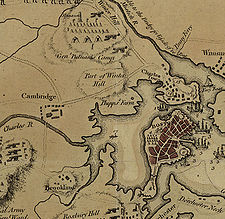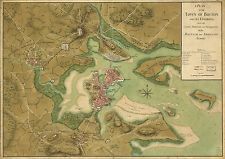In his book Paul Revere’s Ride, David Hackett Fischer starts his chapter on the aftermath of April 19th this way: “It was nearly dark when Lord Percy’s men entered Charlestown. Behind them the sun was setting on the ruins of an empire.
Nice turn of phrase.
 The reactions of the King’s men were varied. Some were full of blame for their commanders. Others, who before this day started held the Americans in contempt, returned to Boston with grudging respect. The men who’d engaged these redcoats in battle were no longer thought of as mere farmers and merchants. They were soldiers.
The reactions of the King’s men were varied. Some were full of blame for their commanders. Others, who before this day started held the Americans in contempt, returned to Boston with grudging respect. The men who’d engaged these redcoats in battle were no longer thought of as mere farmers and merchants. They were soldiers.
Lieut. Barker said of Col. Francis Smith, “had we not idled away three hours on Cambridge marsh waiting for the provisions that were not wanted, we should have had no interruption at Lexington.” And “Being a very fat, heavy man, he would not have reached the bridge itself in half an hour though it was not half a mile.”
Lieut. McKenzie said, “The fact is Gen. Gage had no conception the rebels would have opposed the king’s troops in the manner they did
Others, who before this day started held the Americans in contempt, returned to Boston with grudging respect. The men who’d engaged these redcoats in battle were no longer thought of as mere farmers and merchants. They were soldiers.
Col. Smith said, “I can’t think but that it must have been a pre-concerted scheme in them to attack the king’s troops at the first favorable opportunity.”
Lord Percy who pretty much saved the King’s soldiers from utter destruction, said this: “You may depend on it that as the rebels have now had time to prepare, they are determined to go through with it, nor will the insurrection here turn out so despicable as it is perhaps imagined at home. For my part, I never believed, I confess, that they would have attacked the King’s troops, or have had the perseverance I found in them yesterday.
By June, Gage had come to agree with Percy. “The rebels are not the despicable rabble too many have supposed them to be, and I find it owing to a military spirit encouraged amongst them for a few years past, joined with an uncommon degree of zeal and enthusiasm that they are otherwise… In all their wars against the French they never showed so much conduct, attention and perseverance as they do now.”
Adm. Samuel Graves commander of the Royal Navy in Boston said, “The rebels following the Indian manner of fighting, concealing themselves behind hedges, trees and skulking in the woods and houses whereby they galled the soldiers exceedingly.” Graves made immediate arrangements to get himself out of Boston and ordered his men to not allow any women or children to leave the city – apparently using them as hostages against attack by the rebels. Afterward, he stated, regarding this move, “to keep the women and children in the town,” helped to “prevent an attack upon Boston.”
Days after the 19th, Graves wanted to destroy the towns of Roxbury and Charleston. His flag secretary stated, “ It was indeed the admirals opinion that we ought to act hostile from this time forward by burning and laying waste to the entire country.”

To say the least, the Redcoats were in shock as they looked up to the heights of Boston – a town they owned just days before – to see it completely surrounded by merchants and farmers determined to be free.

